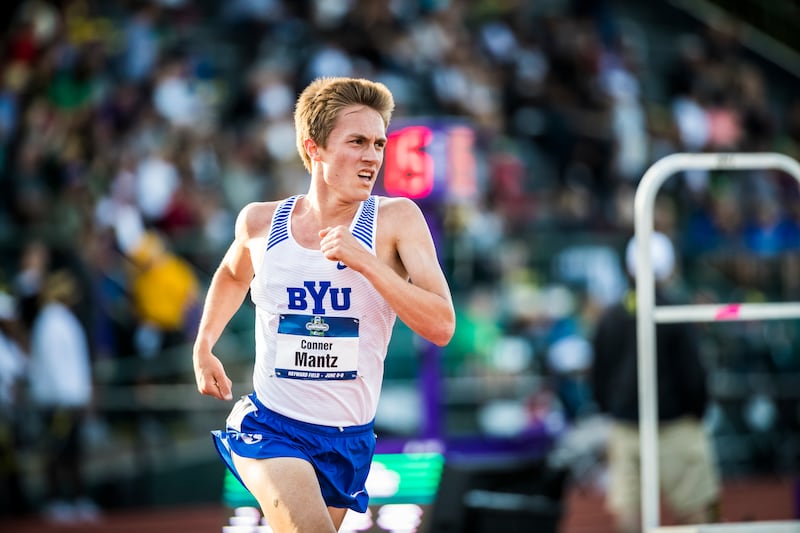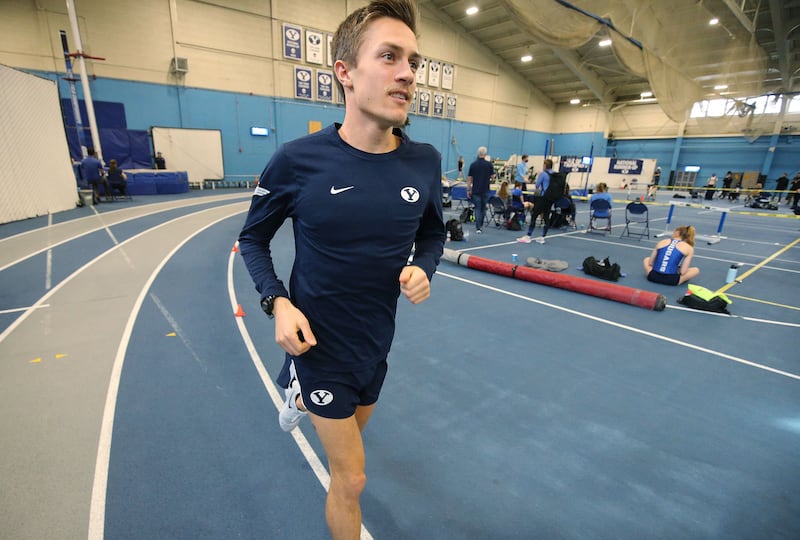For a decade Conner Mantz, a collegiate and U.S. champion distance runner, has known he wanted to attempt a marathon. He suspected, like many of the sport’s aficionados, that it might be his best distance. He bided his time while he competed in track and cross-country for Sky View High and BYU. After a year as a professional runner, he finally made his marathon debut this month and it confirmed what many have predicted for him.
“It wasn’t what I expected. Not at all. It felt like a nice run for 18 miles. Then it was a grind, and by the last mile I was ready to be done. I expected it to be different early on.” — Conner Mantz of his first marathon
The 25-year-old Mantz entered the Chicago Marathon Oct. 9 — among the six most prestigious marathons in the world — and placed seventh overall, first among Americans. His time of 2:08:16 made it the fastest debut marathon ever by an American-born runner, breaking Ryan Hall’s record by eight seconds. The official American debut record of 2:07:56 is held by Leonard Korir, a 35-year-old Kenyan who became a U.S. citizen six years ago.
Only three American-born runners have ever run faster — Galen Rupp (2:06:07 in 2018), Ryan Hall (2:06:17 in 2008) and Dathan Ritzenhein (2:07:47 in 2012)
If you count all American runners — naturalized citizens and native Americans — he is the sixth-fastest ever.
And Mantz believes he could’ve run faster. He and his coach, Ed Eyestone, targeted a sub-2:08 performance. Race organizers assigned a pacesetter for Mantz through 18 miles. The pacer was instructed to run a 4:50-per-mile pace, which translates to about a 2:07:44 marathon.
But the plan quickly fell apart. “Through the first four miles, we were hitting 4:56 to 4:58,” says Mantz. “That doesn’t sound too bad, but it adds up over four miles. It got us off pace. I was telling him to go faster. He told me to relax. He thought we were on pace.”
The pacesetter was supposed to tow Mantz through 18 miles, but Mantz decided to take matters into his owns hands and passed him at 10 kilometers (6.2 miles). He wound up setting the pace himself for the chase pack into a headwind.
He churned out sub-4:50 miles and managed to get back on his targeted pace, hitting the half-marathon in 1:03:45. He covered the 5,000-meter split from the 10K to the 15K in 14:52 — a 2:05:28 marathon pace. It proved to be too much. “I sped up so much that it took something out of me,” says Mantz, who said he was gassed by the time he reached the final mile of the race.
Says Mantz, “It was frustrating. I trained so hard for this and then to be consistently slower because of (the pacing). … I think it cost me some time. Given all that, I’m pretty pleased.”
Eyestone, a two-time Olympic marathoner, was a little more effusive.
“It was amazing to run 2:08:16 like that and make the fastest debut by an American-born runner,” said the coach. Eyestone told Mantz years ago that he could run a marathon in 2:08 or faster, so he was not surprised, but added, “There’s a sense of relief when he actually goes and does it, especially when you know there is so much that can go wrong in a marathon.”
Mantz, who got married six days after the race, earned $15,000 for his seventh-place finish. Two other former BYU runners, Nicolas Montanez and Clayton Young, finished fourth and fifth among Americans.
Mantz’s marathon debut has been anticipated for years by many in the sport, based on his aerobic gifts and his ability to run through discomfort and pain. As early as high school he wanted to try a marathon, but there were always other demands on his racing — namely cross-country and track races at Sky View High and BYU.
After winning the 2020 and 2021 NCAA cross-country championships, he turned professional and signed a contract with Nike. By then the U.S. Olympic Marathon Trials had already been held, so he tried to make the U.S. Olympic team on the track. He narrowly missed making the team, finishing fifth in the 10,000-meter run and eighth in the 5,000 (the top three advance to the Games). He tried to make the U.S. World Championships team last summer but again fell short, finishing seventh in the 10,000 and fourth in the 5,000 in the U.S. championships.
In the year since he turned pro, Mantz made a very successful transition to the road-racing scene, winning two national championships — the 2021 U.S. Half-Marathon Championships and the 2022 U.S. 20K championships — while also finishing runner-up in the 2022 U.S. 8K Championships.
When will he attempt another marathon?
“To be determined,” says Mantz. “There are goals I still want to accomplish on the track. And I’ll probably run another (road) race before the end of the year.” His next big race will be the U.S. Cross Country Championships in January, a month before the World Cross Country Championships in Australia.
“It wasn’t what I expected,” said Mantz of his first marathon. “Not at all. It felt like a nice run for 18 miles. Then it was a grind, and by the last mile I was ready to be done. I expected it to be different early on.”




